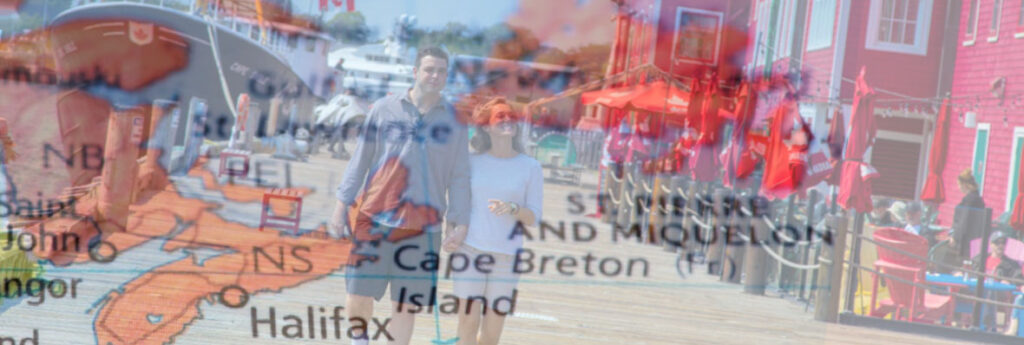Three out of four Atlantic provinces announced Tuesday that they will lift border restrictions and open to travel from across the region beginning next week, while New Brunswick said its opening could come even sooner.
Nova Scotia, Prince Edward Island and Newfoundland and Labrador said a June 23 reopening is possible because of steadily declining COVID-19 rates across the region. The move means travellers won’t have to isolate for 14 days upon entering each province.
“This decision was not made lightly but after much consideration we believe we can open to our Atlantic neighbours,” Nova Scotia Premier Iain Rankin told reporters. “It was the best alignment we (premiers) were able to achieve in our discussions.”
Rankin added that his province is also currently on track to open to the rest of the country no later than July 14. He said discussions were continuing with the other Atlantic premiers on co-ordinating an opening to the rest of Canada.
Nova Scotia’s chief medical officer of health said the regional signs are good for the scheduled reopening.
“Given case numbers and vaccine rates in the Atlantic provinces I’m comfortable we can take this step safely,” said Dr. Robert Strang.
However, New Brunswick Premier Blaine Higgs did not set a firm date for reopening the province to the entire region. But as of Tuesday, those travelling to New Brunswick from P.E.I., Newfoundland and Labrador and the Avignon and Temiscouata regions of Quebec are no longer required to be tested for the virus or to remain in isolation for 14 days.
Higgs also said with the province moving so quickly toward its vaccination goals that border restrictions to Nova Scotia could be lifted before the end of the week.
“We’re talking days, even hours to reach Phase 2,” he said, referring to the province’s plan to open its boundaries on the conditions that 75 percent of New Brunswickers aged 12 and older have received their first dose of a vaccine and 20 percent of those 65 and older have received their second dose. There must also be no new outbreaks.
The premier made it clear that he didn’t want to provide a firm date to make it possible for the province to be the first to open its borders.
Higgs also suggested that the province could lift all of its COVID-19 health restrictions, including the wearing of masks, well before the Aug. 2 target date that it set out on May 27 when it unveiled its reopening plan.
In Prince Edward Island, Premier Dennis King said residents of the other Atlantic provinces as well as the Iles-de-la-Madeleine who have received one shot of COVID-19 vaccine will be able to enter the province without having to self-isolate. The measure will begin with a “soft launch” June 23 for those entering under currently approved travel streams before broadening on June 27.
Newfoundland and Labrador Premier Andrew Furey said residents of Atlantic Canada would be welcome in his province as of 12:01 a.m. June 23, without a requirement for testing and self-isolation.
In a news release Tuesday, Furey said the reopening would benefit local business, reunite family and friends and bring people “closer to a more normal sense of life that we can all appreciate.”
Meanwhile, Nova Scotia announced that it would move into the second phase of its five-step reopening plan on Wednesday.
Under a long list of measures in the next phase, restaurants and bars are allowed to have indoor dining with physical distancing between tables. All retail stores will also be allowed to operate at 50 percent of the store’s capacity, while households can have more than one designated shopper.
The province also announced $12.5 million in direct support for its beleaguered tourism industry on Tuesday.
Labi Kousoulis, minister responsible for Tourism Nova Scotia, said the money is expected to help large and smaller tourism operators “kick start” their businesses after taking a $1.6 billion hit to revenues in 2020.
Under the program, eligible operators that have 10 or fewer rooms will receive a grant worth $1,000 per room, while larger operators are eligible for $500 per room beyond the initial $10,000 grant. Smaller operators who haven’t qualified for other programs can also access one-time $5,000 grants.
Kousoulis said the province would also waive entrance fees to museums and provincial art galleries in July and August, and spend another $3 million on advertising campaigns promoting the province to tourists.
Darlene Grant Fiander, president of the Tourism Industry Association of Nova Scotia, welcomed the financial help along with the news that Atlantic Canada’s provincial borders would soon be reopening.
But, Grant Fiander said tourism operators will be looking for regional coordination on travel measures including consistent guidelines for group travel.
“It would allow group travel to take place seamlessly and it would allow tour operators to start selling packages to other parts of Canada into the Maritimes and eventually Atlantic Canada,” she said.
Nova Scotia reported four new cases of COVID-19 Tuesday and a total of 97 known active cases, while New Brunswick identified three new cases and has 85 active cases. Newfoundland and Labrador reported two new cases and has a total of 41 active infections.

